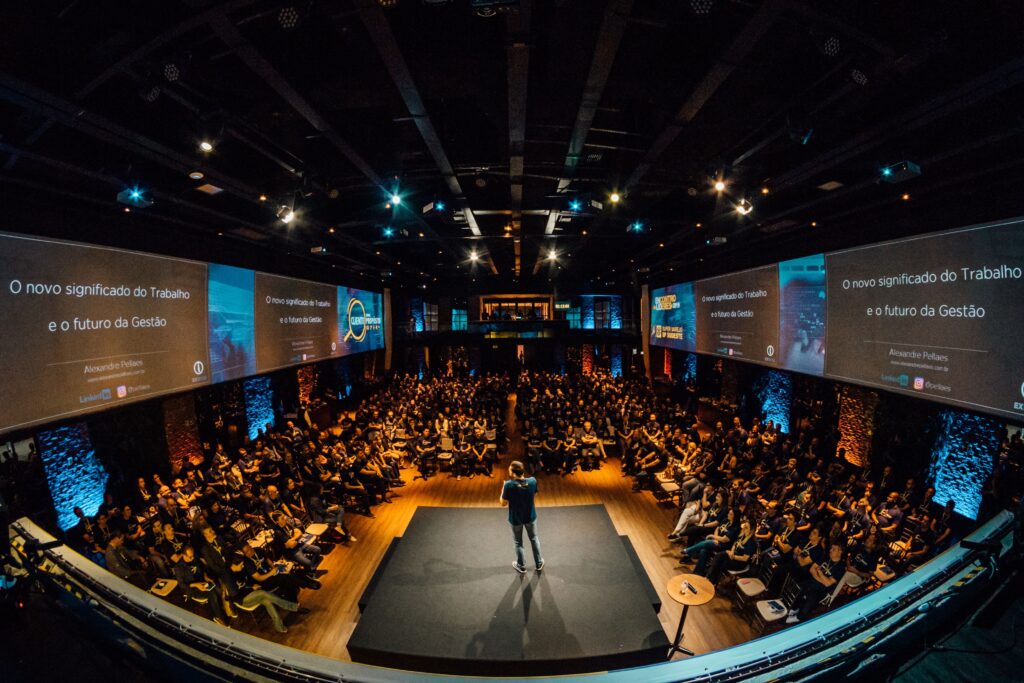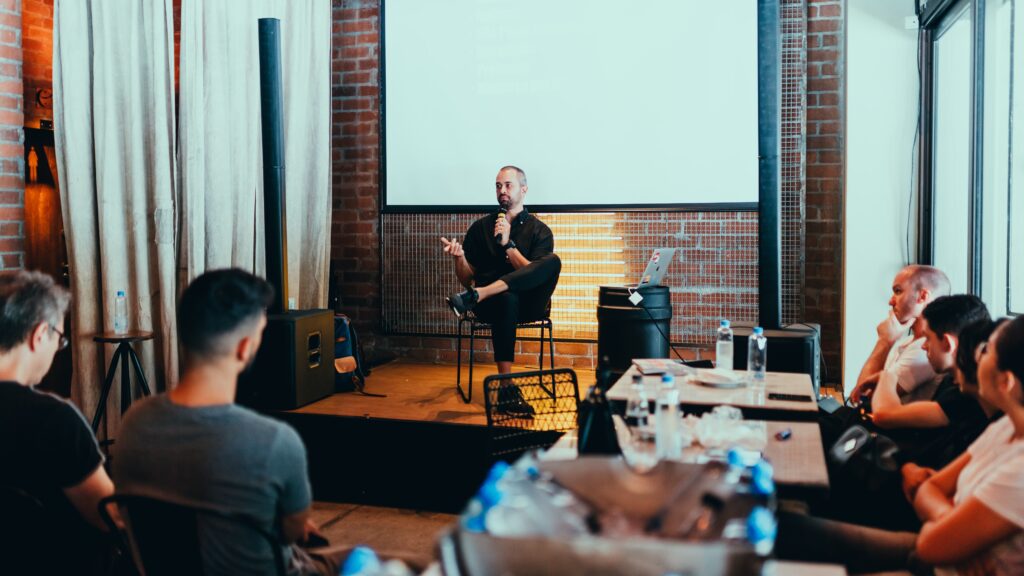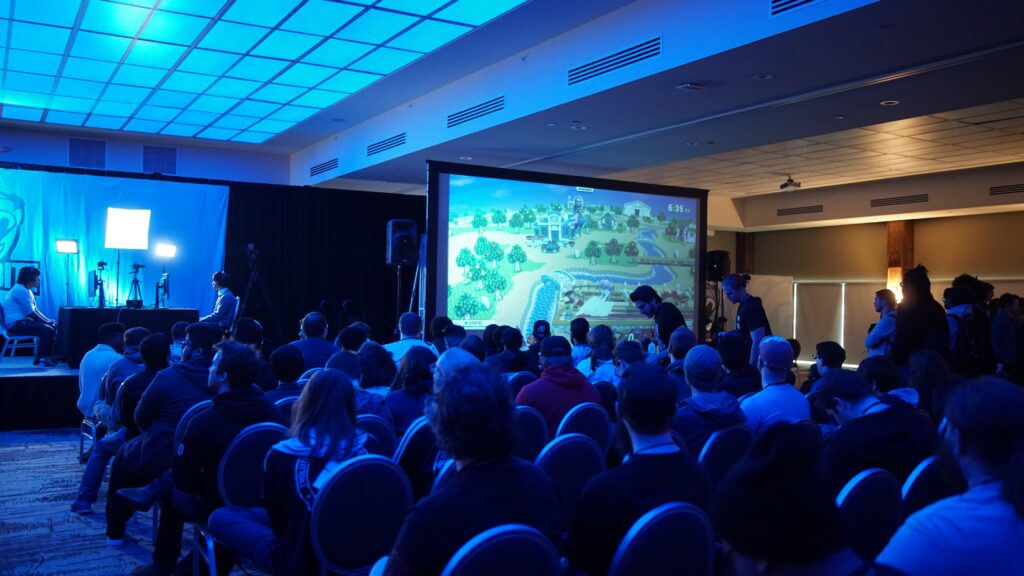
Individuals attend different sorts of professional development events, but understanding their relatability can take time and effort. Conferences, workshops and seminars are all events that bring people together with similar interests.
Although conferences, seminars, and workshops provide learning opportunities, the three have significant differences. In this article, we’ll take a deeper look at each.
So, without further ado, let’s get into the subjects.
Table of Contents
1. Introduction
2. What is a Conference?
3. What is a Seminar?
4. What is a Workshop?
5. Conference vs Seminar vs Workshop: Why & When to Use?
6. Conference Vs Seminar Vs Workshop: Decision Table
7. Conference vs Seminar vs Workshop: What’s the Difference?
8. Pros and Cons of Professional Events
9. To Sum It Up
What is a Conference?
A conference is a significant gathering of individuals to discuss a particular topic or concept. Conferences often have a few keynote speakers who are subject matter experts. They address the participants on a given topic, providing them with expertise and knowledge and helping them stay up-to-date in the area of their interest. Participants can also join in smaller, more intimate conversations on specific topics during breakout sessions. For example- SXSW, Adobe Max etc.

What is a Seminar?
Seminars are more intimate gatherings that often cover just one subject. In most seminars, a group of subject-matter experts moderates a discussion on the subject while providing a chance for audience participation and questions. For example- Real Estate, Artificial intelligence etc.

What is a Workshop?
A workshop is a practical educational session where participants learn new skills or methods. They are usually guided by an expert who illustrates how to perform something, after which participants get to try out the new abilities or methods for themselves. For example- Fashion Photography Workshops, Travel, Landscape, Nature Photography Workshops, Scientific Workshops, etc.

Conference vs Seminar vs Workshop: Why & When to Use?
- Seminars are held to raise awareness and provide a forum for information sharing. The topics covered at seminars might be industry-specific or they can be geared toward assisting participants in bettering their personal or professional life.
- While workshops are held where individuals may gain practical knowledge. They have a subject-matter expert addressing the crowd. You might hold a workshop to clarify your ideas if you are an expert in an area and want to impart your expertise.
- Contrarily, a conference is a discussion among a group of individuals on a topic that may or may not need problem-solving. You must organise or participate in a conference if you work for or are the leader of a company that needs to have a conversation to resolve a problem or discover a method to expand by considering fresh ideas.
Thus, you may distinguish between different aspects of a workshop, seminar, and conference based on your position and goals.
Conference Vs Seminar Vs Workshop: Decision Table
Conference vs Seminar vs Workshop: What’s the Difference?
1. Format
Seminars are structured more like a speech or learning approach in a classroom. In this method, the lecturer, faculty, or educator delivers a speech or contributes to knowledge with a large group of individuals, like how an instructor addresses a classroom full of students.
Workshop involves hands-on exercises. For example- The teacher may discuss a learning concept in a workshop. To effectively explain the idea, the coordinator may collect participants into small groups to participate in exercises, pretend, and other hands-on tasks to apply what the attendees learned during the workshop’s address portion.
Conferences frequently feature a variety of speeches by well-known speakers, as well as individual sessions where academics show their concepts and data visually.
Additionally, several sessions are running concurrently. This implies that participants must select the sessions they wish to attend.
2. Goals
Seminars serve the purpose of bringing together small groups for periodic sessions, each time focused on a different subject, in which everyone present is expected to engage actively. The Instructor prepares visual materials, interactive tools or equipment, and demonstrations to present and discuss the topics.
Workshops provide a strong emphasis on “hands-on practice” or laboratory work. The lab activity is intended to reinforce, imprint, and bring forward an immediate functional dimension. This is enabled by applying and executing the fundamental concept or method. It is presented throughout the lecture and demonstration process with specific practical applications.
A conference is a predefined type of assembly where the participants consult and talk on a range of subjects.
3. Tone & Communication
Seminars are semi-formal and frequently feature a one-way communication flow.
Workshops are more interactive than the others since both tutors and learners communicate.
Conferences operate in a consultative fashion with a two-way communication road. All participants are obligated to offer their opinions on the particular topic, and a resolution is established towards the end.
4. Role of Speaker
The variety of seminar topics often enables the session facilitator to address a particular audience, such as a professional association or industry.
A workshop is where you may interact personally with your teacher, ask questions, work together and have a more exclusive experience.
A conference offers the chance to learn more about your professional course through various keynote speakers, networking opportunities, and conferences.
5. Benefits
Seminars are often conversational and led by one or two subject-matter experts.The pricing varies due to its scale and operation. It is advised if you want to deepen your understanding of a certain subject because it tends to be more academic in character, focusing on lectures and research.
Workshops are typically less expensive and give participants practical skills they may apply in their careers. A workshop is an excellent option if you’re looking for a chance to learn new skills and meet new people.
Attending conferences may be quite expensive, and the rewards are sometimes inconsistent. However, a conference is the one to go to if you’re seeking chances to network or hear from business leaders.
6. Type of Activity
A seminar setting could only include the main topic; there might not be any follow-up activities or classes for the attendees to put the knowledge they have learned in class to use.
Participants can choose from a wide variety of exercises, courses, and activities in the workshops.
All members should actively participate and contribute during conferences. It includes communicative activities such as debates and declamations.

7. Participation of Audience
Seminars often has substantially larger crowds on the premises. It consists mainly of a specialist educating a group of participants on a certain topic.
Due to the hands-on activities that are a part of the workshop experience, workshops frequently feature smaller crowds of individuals or are divided into fewer groups.
The magnitude of conferences is considerably large. They frequently occur in big conference halls or auditoriums and attract hundreds or even thousands of attendees.

8. Duration
Seminars are usually brief. They usually last an hour and a half to three hours.
Workshops are often longer than seminars. They usually last for several days or less, depending on the requirement.
A conference is more extensive than both- seminars and workshops. It comprises a thorough examination of the issue under discussion. Because of the prolonged length, participants are supplied with lodging.
Pros and Cons of Professional Events
1. Seminars
Pros
- The instructor can teach modules that build on one another.
- The consolidated block of time aids in focusing users’ attention on the seminar topic.
- Leading a group (e.g., a class or a lab group) contributes to developing a peer support network.
- Users get the knowledge that they may quickly apply to real-world information challenges.
Cons
- It is difficult to prevent scheduling conflicts.
- It takes much effort to prepare and deliver
2. Workshops
Pros
- Attendees are often very motivated
- Workshops might vary in duration and frequency of sessions.
- Can provide a series of workshops that build on each other
Cons
- Participants may have a distinguished understanding of the technical jargon of the subject matter.
- It may be difficult to accommodate all you wish to cover into a single workshop.
- Management of big classes for hands-on practice can be challenging.
3. Conferences
Pros
- The conference promotes the interchange of ideas and viewpoints.
- It fosters communication and networking by incorporating a large number of people from separate organizations.
- Participants gain vital knowledge and learn about other people’s points of view. This broadens delegates’ perspectives on organizational requirements and difficulties.
- The conference contributes to the goodwill of the participating organizations. It also contributes to the prestige of the organization hosting the conference.
Cons
- If the conference convener is incompetent, or the delegates are uncooperative, confusion ensues, and the entire exercise is rendered ineffective.
- The conference’s core aim is frequently defeated when a small number of attendees control the whole conversation.
- A conference frequently turns into a pointless activity as it can only offer recommendations. Rarely are any of these proposals followed up with actual action.
To Sum It Up
This blog post should have made the differences between conferences, seminars, and workshops more clear. Additionally, we hope that our blog post will assist you in deciding which option is best for you. All these three communication channels are crucial for the learning process. Seminars enable idea sharing. Workshops allow the dissemination of knowledge from an expert to others who are eager to learn. A conference is a free forum where knowledgeable experts can come to an agreement on how to conduct business best. In their respective fields of employment, all three are equally crucial.
And for more clarity, don’t forget to check out Eventible, where we track the largest group of professionals searching for the finest events (be it conferences, seminars or workshops) to attend and provide more information about various professional events. We bring in the efforts from organizers and sponsors together with feedback from event attendees, in order to bring transparency and closeness between expectations and results through our platform.




Comments are closed.